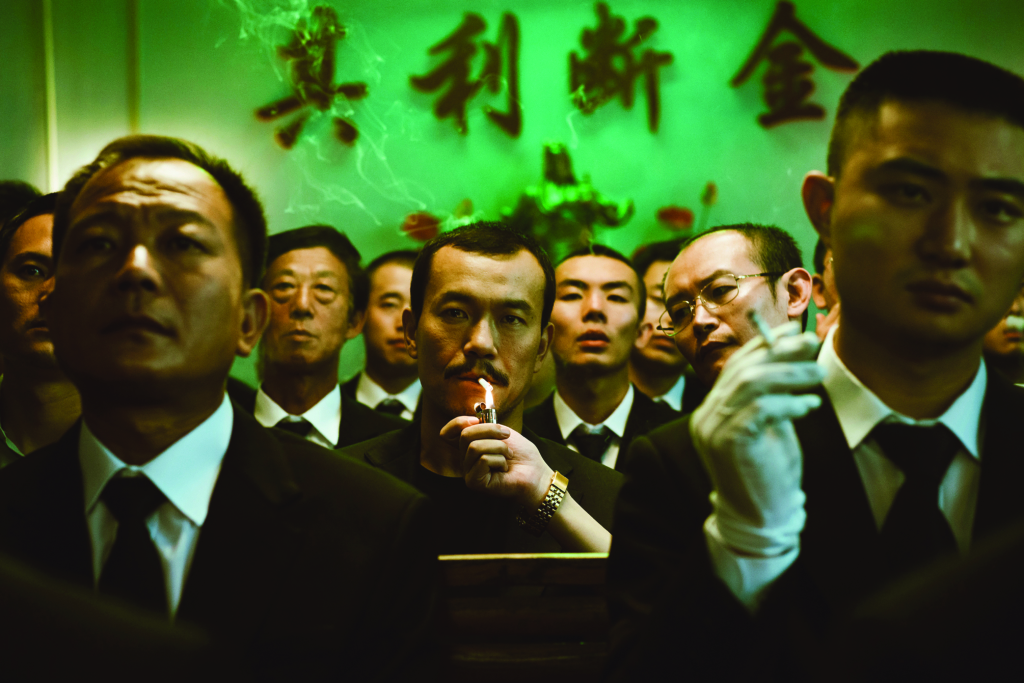Jia Zhang-Ke has been busy. In the year since his last feature, Mountains May Depart (2015), he has produced several films through his company, Xstream Pictures; contributed a segment to the omnibus film Where Has the Time Gone? (2017); played a key role in inaugurating the Pingyao International Film Festival; and also knocked out a standalone short, The Hedonists (2016). And, while it wouldn’t be unreasonable to fear that Jia seems to be spreading himself mightily thin, fans need not worry. Returning with Ash Is Purest White (2018), the writer/director is firing on all cylinders, his focus as refined as ever. Jia’s is a body of work marked by subtle inflections and modulations as he returns to the same set of concerns from film to film. His characters have often hovered on the peripheries of criminality, but Ash plunders gleefully and wholeheartedly from the gangster film without losing sight of its maker’s trademark concern for his rapidly transforming homeland.
At the centre of the film once again is Zhao Tao, a mainstay of Jia’s film world since Platform (2000). Zhao’s roles for Jia tend to act as audience surrogates, bearing witness to social and historical change. The narrative function of her character is effectively no different in Ash, but she brings a new gravitas to this particular role, as she and Jia collectively embrace the possibilities of full-throated melodrama.
This may seem a long way from Jia’s debut feature. Xiao Wu (1997) displayed the kind of gritty attention to realism and close observation of its social milieu that placed it at the forefront of the burgeoning Sixth Generation[1]See Jia Zhang-Ke, ‘Speaking of “the Sixth Generation”: I Don’t Believe That You Can Predict Our Ending’, trans. Isabella Tianzi Cai, dGenerate Films, 10 November 2010, <http://dgeneratefilms.com/critical-essays/full-translation-of-jia-zhangkes-essay-on-sixth-generation-cinema-now-available>, accessed 26 October 2018. of Chinese filmmakers. His sophomore effort, Platform, summoned the full sweep of history, documenting the social impact of China’s market reforms in the 1980s. The director’s subsequent career has alternated between these two poles: Unknown Pleasures (2002) returned despairingly to the grime of Xiao Wu, and similar material was given a glossier treatment in passages of his ambitious anthology film A Touch of Sin (2013). Meanwhile, Platform’s epic scale was recast to feature an outward-looking pivot to globalism in the aptly titled The World (2004). Jia’s second-most-recent feature, Mountains May Depart, almost felt like a conclusion to this period of his work, embarking from its director’s autobiographical stomping ground of Fenyang once again, and racing through his favoured narrative tropes in accelerated fashion before arriving at its pseudo-science-fiction third act, a move that wrong-footed some viewers.[2]See, for example, Jonathan Romney, ‘Film of the Week: Mountains May Depart’, Film Comment, 11 February 2016, <https://www.filmcomment.com/blog/film-of-the-week-mountains-may-depart/>, accessed 29 October 2018. At times, Ash feels like a compilation of Jia’s greatest hits. For one, it shares its immediate predecessor’s trifurcated structure. We also return to the Fengjie setting of Still Life (2006) and see a familiar dance troupe – evoking Platform – performing with a band on a flatbed truck (joined, this time, by a tiger, itself representing perhaps a nod to A Touch of Sin). And a pumping rendition of ‘YMCA’ recurs throughout, just as the repeated use of the Pet Shop Boys’ ‘Go West’ heralded the march of economic reform in Mountains May Depart.

Ash Is Purest White opens in Academy ratio, with digitally zoomed camcorder images of Zhao capturing one of many anxious faces jostling on a bus, the sound of a train whistle signifying mass migration. The film soon expands into a widescreen frame, lensed by Olivier Assayas’ regular cinematographer Eric Gautier. Jia’s narrative begins in 2001 in Datong, the city in China’s northern province of Shanxi that also served as the setting of Unknown Pleasures. Zhao plays Qiao, girlfriend of small-time gangster Bin (Liao Fan, memorable as the detective on the trail of a serial killer in Diao Yinan’s 2014 Black Coal, Thin Ice).[3]Diao has a brief acting role in Ash Is Purest White. The economically depressed Datong offers a series of contrasts: Qiao dreams of a better life for her father. He is introduced as alcoholic and near-destitute, slipping into a drunken communist reverie as strikes cause the local mine to grind to a halt. Qiao and Bin, on the other hand, enjoy a life of relative opulence and glamour, afforded by the latter’s criminal exploits. Their playground extends from backroom mahjong parlours to nightclub dance floors, upon which Bin’s assembled crew pour expensive moutai spirits into a bowl and fill their glasses to toast their shared brotherhood. Bin asserts his dominance over fellow gangsters with acts of bravado, and Qiao calmly basks in his reflected glow. Meanwhile, a literal Chekhovian handgun exerts a talismanic power as it passes from character to character, its sinister presence hinting that these days will not last. When Bin’s boss speaks of incoming housing developments, we get the sense that the spheres of criminality, party politics and major infrastructure projects are already merging. Nevertheless, participation in this underworld still has its dangers, and, when his boss is suddenly murdered, Bin comes into conflict with a new, younger, brasher generation of rival criminals. When he is ambushed and savagely beaten by a gang of motorcyclists, Qiao rushes to his defence, wielding the portentous firearm in an act that will have consequences for both of their lives, sending them on divergent paths. For her part in possessing this illegal weapon, Qiao is sentenced to five years in a snowbound labour prison.[4]The lengthy sequence in which two police officers explain her charges is a rare moment in which we sense the possible intervention of the state censor’s hand – an administrative process that was recently reconsolidated under the control of the party’s cabinet. See Patrick Frater, ‘China to Put Media Under Cabinet-level Control, Abolish SAPPRFT’, Variety, 13 March 2018, <https://variety.com/2018/film/asia/china-media-under-cabinet-level-control-abolish-sapprft-1202725104>, accessed 31 October 2018.
For Jia, as ever, grand gestures remain inscribed within the personal, suggesting the futility of Qiao’s attempt to reclaim her past … she is determined to find Bin, who has left his criminal ways behind, a newfound position of power rendering him inaccessible.
The film’s second act follows Qiao after her release from prison, as she attempts to find Bin and reunite with him. This journey takes her to Fengjie, marking a return for Jia both geographically and narratively: Still Life employed the same backdrop for its search for missing spouses. In this earlier film, our experience of the story was complicated by our knowledge that the actual location would soon be inundated with the waters of the enormous Three Gorges Dam project, deepening our ontological awareness that we were witnessing this place in its final days.[5]See Richard James Havis, ‘Flashback: Still Life (2006) – Jia Zhangke’s Three Gorges Dam Chronicle of Destruction and Despair’, Post Magazine, 29 July 2017, <https://www.scmp.com/magazines/post-magazine/arts-music/article/2104287/flashback-still-life-2006-jia-zhangkes-three>, accessed 31 October 2018. By returning now to a fictional Fengjie that we know no longer exists in reality, Ash Is Purest White creates, as critic Sam C Mac describes it, a ‘dissonance [that] becomes a means for Jia’s most moving and unique comment yet on the rapid spatial transformation of modern China’.[6]Sam C Mac, ‘Ash Is Purest White’, Slant, 22 May 2018, <https://www.slantmagazine.com/film/review/ash-is-purest-white>, accessed 31 October 2018. But, for Jia, as ever, grand gestures remain inscribed within the personal, suggesting the futility of Qiao’s attempt to reclaim her past. Cut loose from the status of her former life, she now has to quickly concoct scams and crimes of opportunity simply to get by – and these impromptu schemes yield the film’s strongest comic moments.[7]Also contributing to the comic stakes are directors Feng Xiaogang’s and Zhang Yibai’s cameos, which left the packed 2018 Melbourne International Film Festival session I attended in stitches. Her adoption of such desperate measures is not without purpose: she is determined to find Bin, who has left his criminal ways behind, a newfound position of power rendering him inaccessible. Qiao is left adrift, traversing the country using its rail networks, running grifts.

Jia often chronicles the passage of time in an epic register. He is also a filmmaker who has long demonstrated his command of cinematic space, which is on full display in Ash’s two bravura sequences that cap its first and second narrative acts. Jia also stages the scene in which Bin and Qiao are fatefully set upon by the biker gang as a dazzling action sequence, deploying complex choreography through a single long take that puts many recent action films to shame, while recalling the spatial clarity of Hong Kong’s long-since-passed action heyday. This sequence finds its ghostly echo in Ash’s emotional centrepiece, in which Jia’s complex staging is reprised in more muted and maudlin tones: we watch as Qiao and Bin share their lonely reunion in a desolate motel room and face the consequences of their years of separation over the course of a single, remarkable long take.
Bin once enjoyed the status accorded to him in the society of the jianghu, a term that literally translates to ‘rivers and lakes’ and a central concept in traditional Chinese wuxia folklore. Originally referring to the closed community of martial-arts practitioners, it has since been adopted by outlaws to refer to their shared code of loyalty when among outsiders;[8]See Helena Yuen Wai Wu, ‘A Journey Across Rivers and Lakes: A Look at the Jianghu in Chinese Culture and Literature’, 452°F Electronic Journal of Theory of Literature and Comparative Literature, no. 7, pp. 58–71, available at <https://www.452f.com/pdf/numero07/07_452f-mono-helena-yuen-wai-orgnl.pdf>, accessed 31 October 2018. for Bin and his cronies, obsessive adherence to the jianghu determines their behaviour and interactions. Jia then ties this tradition into Hong Kong’s much-celebrated ‘heroic bloodshed’ cycle of films, which followed in the wake of A Better Tomorrow (John Woo, 1986) and often inspire fierce cult devotion.[9]See Anthony Leong, ‘The Films of John Woo and the Art of Heroic Bloodshed’, MediaCircus, 1998, <http://www.mediacircus.net/johnwoo.html>, accessed 31 October 2018. Jia invokes this cinematic legacy in sophisticated ways. Early in the film, Bin and his jianghu brothers are shown watching the Chow Yun-Fat vehicle Tragic Hero (Taylor Wong, 1987) in a smoke-filled room, their faces beaming. Additionally, Sally Yeh’s rendition of the theme song for The Killer (Woo, 1989) features prominently throughout Ash as an emotionally resonant musical refrain. Yeh’s song, in turn, summons memories of Woo’s film, which itself is something of a baroque elegy to Hong Kong’s prosperous commercial cinema of the 1980s, before the industry began its long, slow slump into a malaise from which it is yet to fully emerge.

Beginning in the early 2000s, Ash finds Woo’s gangster tropes continuing to elicit an aspirational fascination from the mainland’s criminal wannabes, who use Hong Kong money and cigars as flashy status signifiers that are incongruous with their downtrodden surroundings. And, just as Bin and his squad venerate the jianghu at every opportunity, Jia alludes to Woo’s vision of masculine codes of honour and the obverse temptation of disloyalty. Yet, despite Bin’s public displays of fealty, when it comes down to it, he privately betrays these values, and it is Qiao who must strike out on her own. Cast out of gangsterdom’s domain of performative masculinity, she adopts the ways of jianghu with steely resolve, not as a signifier of cultural capital within an imagined fraternity, but as a survival mechanism on her journey into the unknown. By the film’s third act, the lure of Hong Kong glamour is forgotten as our arrival in the present day is heralded by a drone shot of a Datong now unrecognisable due to high-rise development, and a world newly defined by omnipresent smartphones and watchful camera-eyes.
In the film’s neatly bookended conclusion, its scope closes down to a more intimate scale, as Qiao and Bin both find themselves back in Datong, their respective circumstances very much changed. Qiao is now a bastion of solitary fortitude, no longer simply the good woman of Datong. Her mastery of the realm of the jianghu is summoned in a tracking shot that references Goodfellas (Martin Scorsese, 1990) as she passes confidently through the mahjong parlours of Ash’s earlier stretch. Bin’s return will test both her compassion and her adopted value system. As the film approaches its inevitable conclusion, Jia’s metaphor of the river haunts his characters like a curse. Such a voyage also featured in Jia’s short Cry Me a River (2008), carrying its characters back to their pasts. Now, the figurative rivers and lakes of the jiangu deliver Qiao to a land that is at once unchanged and unfamiliar.
Time is a river that runs only one way. Just as cinephiles might long to return to Hong Kong’s bygone cinematic era, and just as the waters of the Three Gorges Dam inundate the city of Fengjie, so, too, are our pasts both irreversible and irretrievable. In Ash Is Purest White’s symmetrical structural logic, Bin and Qiao’s bitterly ironic reunion and its consequences reveal that, while we cannot go back to the past, it can return to us, enclosing us within cycles of repetition as the world moves on around us.
Endnotes
| 1 | See Jia Zhang-Ke, ‘Speaking of “the Sixth Generation”: I Don’t Believe That You Can Predict Our Ending’, trans. Isabella Tianzi Cai, dGenerate Films, 10 November 2010, <http://dgeneratefilms.com/critical-essays/full-translation-of-jia-zhangkes-essay-on-sixth-generation-cinema-now-available>, accessed 26 October 2018. |
|---|---|
| 2 | See, for example, Jonathan Romney, ‘Film of the Week: Mountains May Depart’, Film Comment, 11 February 2016, <https://www.filmcomment.com/blog/film-of-the-week-mountains-may-depart/>, accessed 29 October 2018. |
| 3 | Diao has a brief acting role in Ash Is Purest White. |
| 4 | The lengthy sequence in which two police officers explain her charges is a rare moment in which we sense the possible intervention of the state censor’s hand – an administrative process that was recently reconsolidated under the control of the party’s cabinet. See Patrick Frater, ‘China to Put Media Under Cabinet-level Control, Abolish SAPPRFT’, Variety, 13 March 2018, <https://variety.com/2018/film/asia/china-media-under-cabinet-level-control-abolish-sapprft-1202725104>, accessed 31 October 2018. |
| 5 | See Richard James Havis, ‘Flashback: Still Life (2006) – Jia Zhangke’s Three Gorges Dam Chronicle of Destruction and Despair’, Post Magazine, 29 July 2017, <https://www.scmp.com/magazines/post-magazine/arts-music/article/2104287/flashback-still-life-2006-jia-zhangkes-three>, accessed 31 October 2018. |
| 6 | Sam C Mac, ‘Ash Is Purest White’, Slant, 22 May 2018, <https://www.slantmagazine.com/film/review/ash-is-purest-white>, accessed 31 October 2018. |
| 7 | Also contributing to the comic stakes are directors Feng Xiaogang’s and Zhang Yibai’s cameos, which left the packed 2018 Melbourne International Film Festival session I attended in stitches. |
| 8 | See Helena Yuen Wai Wu, ‘A Journey Across Rivers and Lakes: A Look at the Jianghu in Chinese Culture and Literature’, 452°F Electronic Journal of Theory of Literature and Comparative Literature, no. 7, pp. 58–71, available at <https://www.452f.com/pdf/numero07/07_452f-mono-helena-yuen-wai-orgnl.pdf>, accessed 31 October 2018. |
| 9 | See Anthony Leong, ‘The Films of John Woo and the Art of Heroic Bloodshed’, MediaCircus, 1998, <http://www.mediacircus.net/johnwoo.html>, accessed 31 October 2018. |





